Overview
Are you concerned about your liver health, especially if you’re dealing with fatty liver disease? You’re not alone, and it’s important to know there are ways to support your liver. This article discusses ten essential supplements that can truly make a difference in your wellness journey.
Imagine if you could protect and restore your liver with the right nutrients. Supplements like:
- Milk thistle
- Omega-3 fatty acids
- Vitamin E
have shown promising effects in clinical research. These powerful allies can improve liver function and reduce inflammation, helping you feel better and more vibrant.
Taking care of your liver is not just about treatment; it’s about nurturing your overall health. By incorporating these supplements into your routine, you can take proactive steps toward a healthier future. We understand that navigating health challenges can be overwhelming, but remember, you’re not alone in this journey.
Together, let’s explore how these supplements can support your liver health. You might be wondering how to get started. Consider talking to a healthcare professional about which options are best for you. Your wellness is a priority, and with the right guidance, you can empower yourself to make informed decisions.
In conclusion, taking action today can lead to a healthier tomorrow. Embrace the possibility of improved liver health and well-being. Let’s take this journey together, step by step.
Introduction
The liver, often referred to as the body's detox powerhouse, is crucial for our overall health, yet many of us tend to overlook its care until problems arise. Have you ever thought about how much your liver does for you? Exploring the world of fatty liver supplements opens up a treasure trove of options that not only support liver function but also enhance our overall wellness.
As liver-related disorders become increasingly common, you might be wondering: which supplements truly make a difference, and how can they be seamlessly integrated into our daily routines? This article delves into ten essential fatty liver supplements, offering insights into their benefits, recommended dosages, and the science behind their efficacy. Together, we can empower ourselves to take proactive steps toward optimal liver health.
Milk Thistle: A Natural Protector for Liver Cells
Are you concerned about your liver health? Milk thistle, particularly its active component silymarin, offers considerable protective effects on hepatic cells against toxins and inflammation. Research indicates that silymarin not only supports the regeneration of liver tissue but also enhances organ function in individuals facing liver-related disorders, including non-alcoholic fatty liver disease (NAFLD).
Imagine if you could safeguard your liver from NAFLD and other forms of organ damage. Richard Thompson notes that silymarin can play a vital role in this protective process. A systematic review of clinical trials has shown that silymarin can lead to significant decreases in enzyme levels, which are key indicators of liver health. For instance, a meta-analysis revealed that silymarin treatment resulted in reduced enzyme levels in the liver, demonstrating its effectiveness.
You might be wondering about the right dosage. Typical dosages range from 140 to 600 mg daily, tailored to your personal wellness needs and formulations. Regular intake of silymarin can enhance detoxification processes and improve overall liver function. Together, we can promote your liver wellness effectively.
Consider incorporating silymarin into your routine as a vital fatty liver supplement. Your liver deserves the best care, and silymarin can be a supportive ally in your wellness journey.
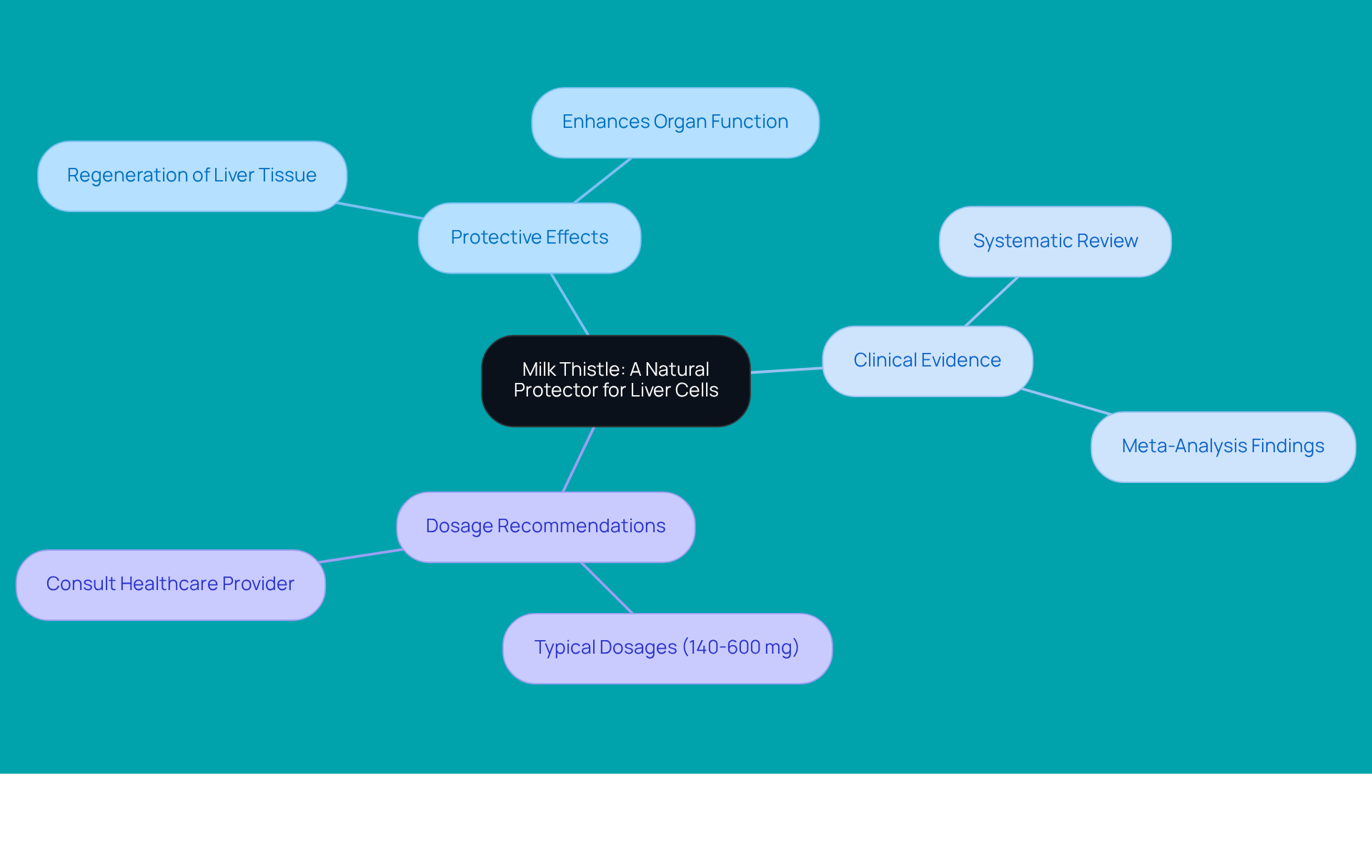
Omega-3 Fatty Acids: Essential for Reducing Liver Fat
Omega-3 fatty acids, primarily sourced from fish oil and certain plant oils, are essential for supporting our organ health. They play a crucial role in reducing fat and enhancing enzyme levels, which can be especially beneficial for those concerned about their well-being. Imagine if you could significantly decrease fat content and inflammation in your organs just by adjusting your diet.
Clinical studies suggest that a daily intake of 2 to 4 grams of omega-3s can lead to therapeutic benefits. These fatty liver supplements not only improve lipid metabolism but also lower triglyceride levels, making them vital for anyone grappling with fatty organ conditions. Incorporating omega-3-rich foods into your meals can be a simple yet effective way to nourish your body. Think about adding:
- Fatty fish like salmon
- Sardines
- Mackerel
- Flaxseeds
- Chia seeds
- Walnuts
Recent research highlights that fatty liver supplements, along with omega-3 supplementation, can help normalize elevated enzyme levels, supporting overall detoxification and repair. This happens by enhancing cell membrane flexibility and improving blood flow in hepatic tissues. However, you might be wondering about potential side effects. Some individuals may experience mild discomfort, such as a fishy aftertaste, nausea, or digestive upset. It's always wise to consult with a specialist in the hepatic system or a gastroenterologist before starting any fatty liver supplements, especially if you have existing hepatic conditions.
Taking care of our organs is vital. Did you know that 30-40% of people with nonalcoholic fatty liver disease may progress to more serious conditions like NASH? Together, we can prioritize our health and take proactive steps towards wellness. By understanding the role of omega-3s and making informed dietary choices, we can support our bodies in the best way possible.
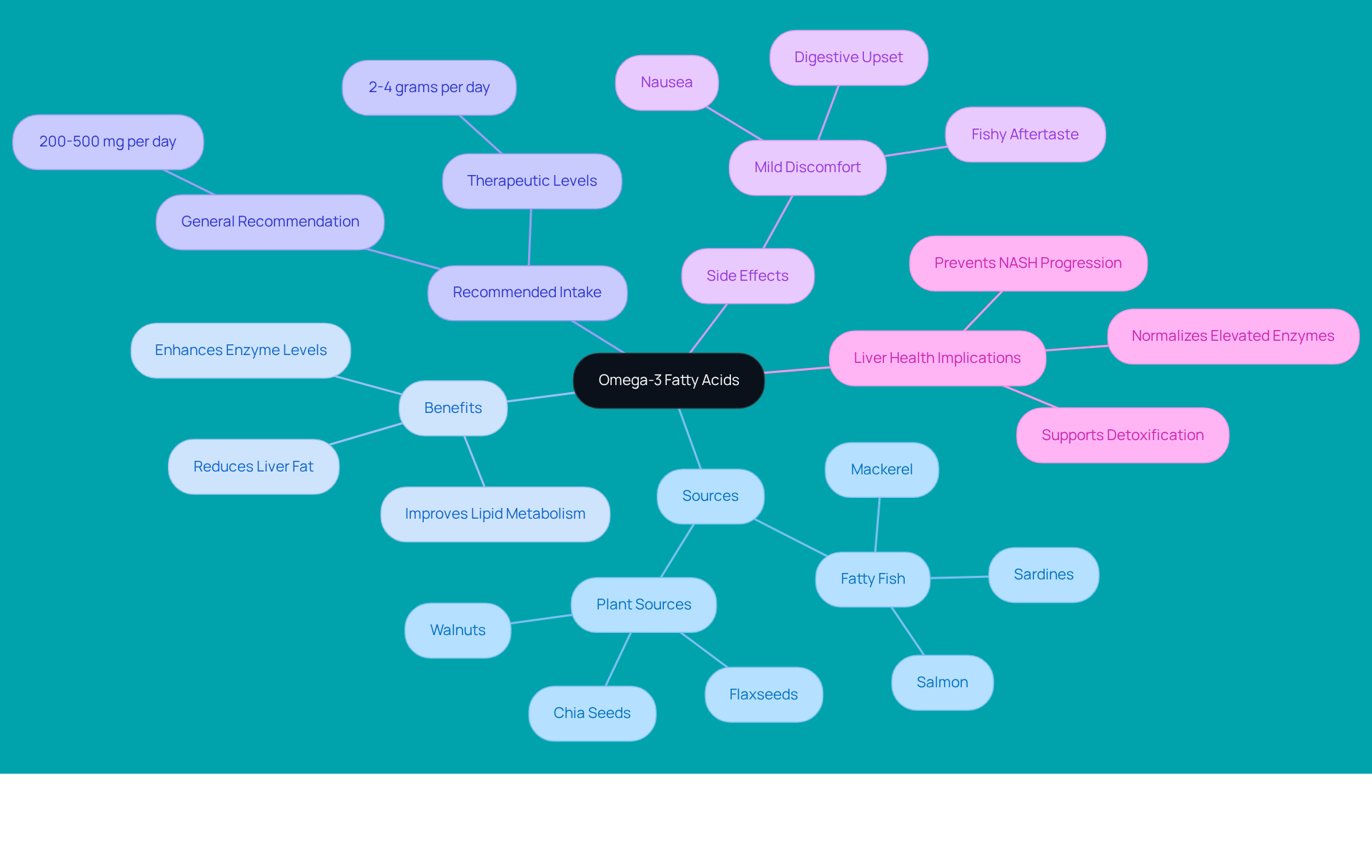
Vitamin E: Antioxidant Support for Liver Health
If you're concerned about liver health, you might be wondering how to reduce oxidative stress and inflammation linked to non-alcoholic fatty liver disease (NAFLD) with fatty liver supplements. Vitamin E could be a valuable ally in your wellness journey. Clinical studies, including one published in Cell Reports Medicine, suggest that a daily dosage of 400 to 800 International Units (IU) can lead to significant improvements in liver function and histology.
This fat-soluble vitamin works by neutralizing free radicals, protecting your liver cells from oxidative damage. Imagine if you could reduce key markers of liver inflammation, such as serum alanine aminotransferase (ALT) and aspartate aminotransferase (AST) levels, by standardized mean differences of -0.82 and -0.68, respectively. These improvements can be encouraging for those seeking solutions for their liver health, such as fatty liver supplements.
However, it's essential to approach supplementation with care. If you have pre-existing health conditions, consulting with a healthcare provider before beginning any regimen is crucial. The American Association for the Study of Liver Diseases (AASLD) recommends considering fatty liver supplements, including Vitamin E, for individuals with metabolic dysfunction-associated steatohepatitis (MASH) who do not have diabetes.
While Vitamin E is generally well tolerated, some people may experience mild gastrointestinal symptoms. Therefore, discussing all supplements with your healthcare team is vital to ensure a safe and supportive approach to your health. Together, we can navigate your wellness journey with care and understanding.
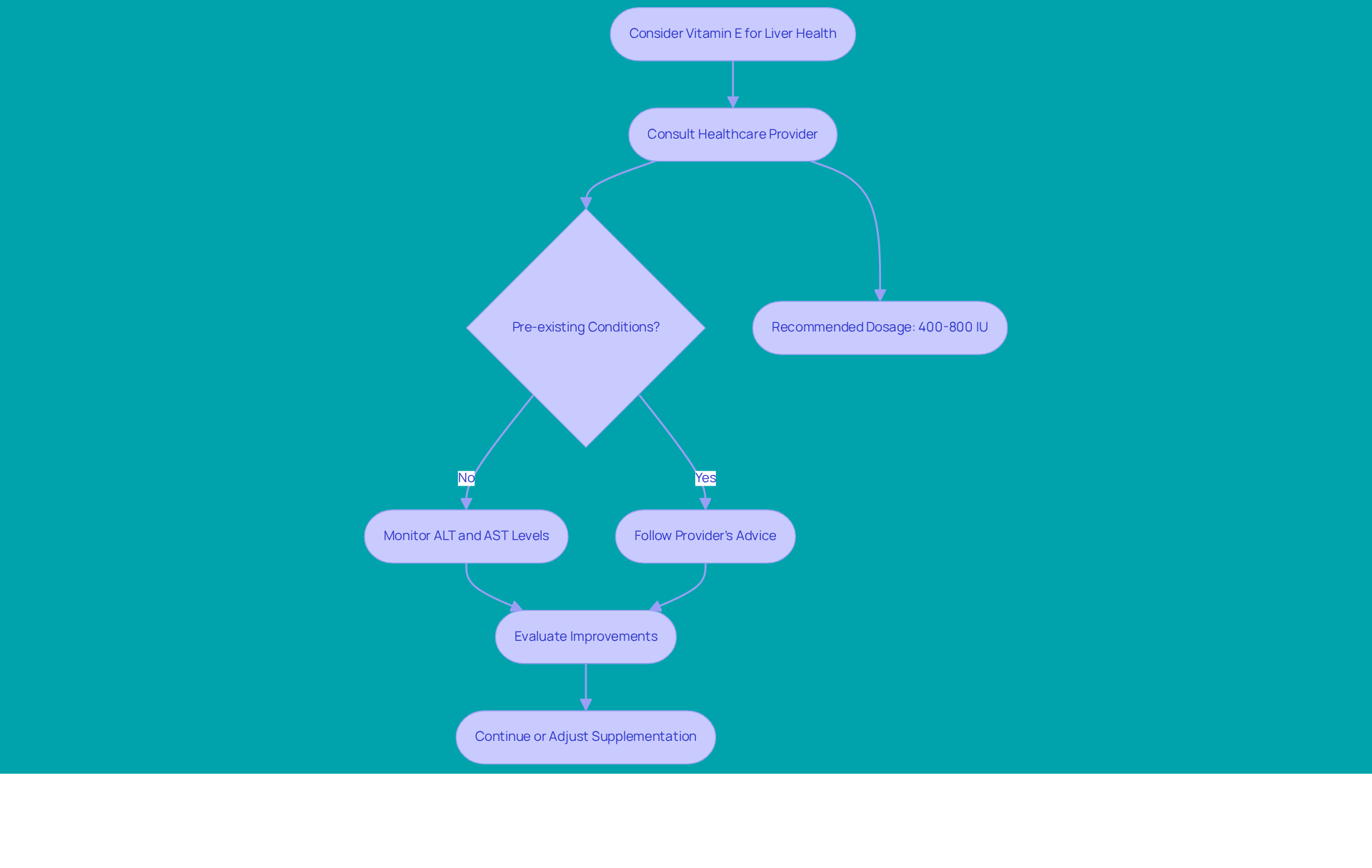
Turmeric: Anti-Inflammatory Benefits for Liver Function
Turmeric has long been celebrated in traditional medicine for its potent anti-inflammatory and antioxidant properties. You might be wondering, how can this spice truly benefit my health? The active compound, curcumin, has been shown to significantly decrease hepatic inflammation and improve organ function. Imagine if a daily consumption of curcumin between 500 to 2,000 mg could provide significant advantages for your hepatic health. However, it's important to note that the World Health Organization recommends a maximum daily turmeric dose of 200 mg for a 150-pound individual, highlighting the need for caution in our wellness journey.
To maximize its effectiveness, pairing turmeric with black pepper (piperine) is crucial, as it significantly boosts curcumin absorption. Yet, emerging evidence indicates that excessive dosages can lead to organ damage. Alarmingly, 20% of toxicity cases are associated with herbal and dietary supplements. This underscores the importance of adhering to recommended limits and consulting healthcare professionals before starting any fatty liver supplements regimen.
As Dr. Dina Halegoua-De Marzio points out, many individuals believe that fatty liver supplements are safe, but we must remain vigilant about the potential dangers of liver harm. A cautionary tale is that of Katie Mohan, who suffered significant organ damage after taking a concentrated turmeric supplement. Her experience illustrates the potential dangers of high turmeric dosages. Together, let’s prioritize our health by approaching supplementation with care and informed choices.
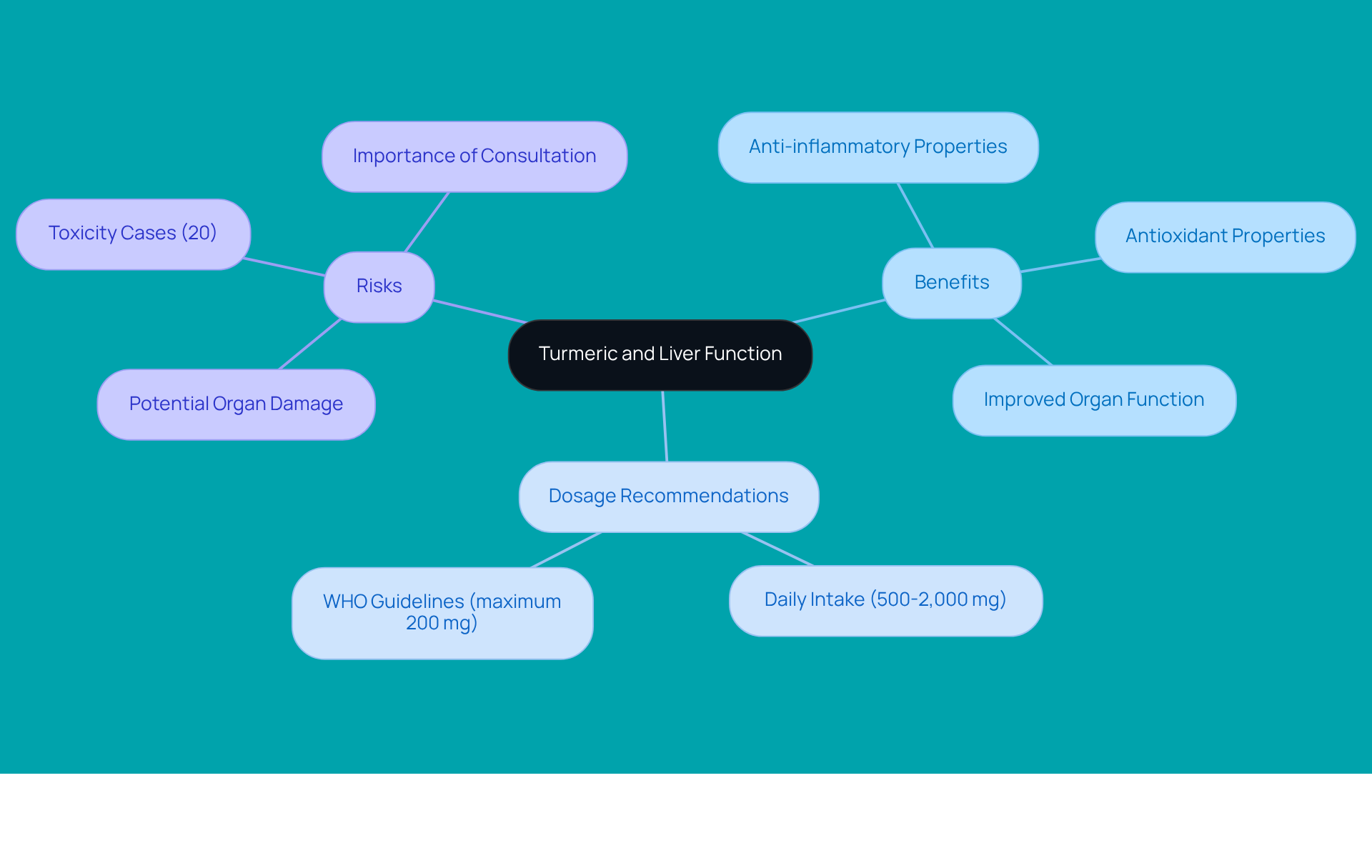
Probiotics: Supporting Gut and Liver Health
Probiotics, often referred to as helpful microbes, are vital for promoting digestive well-being and can significantly enhance organ performance. You might be wondering how these tiny allies can make such a big difference. Clinical research reveals that specific strains, particularly Lactobacillus and Bifidobacterium, are effective in reducing fat in the organs and boosting enzyme levels. For optimal benefits, a daily intake of 10 to 20 billion CFUs (colony-forming units) is typically recommended, as supported by recent studies.
Imagine incorporating probiotic-rich foods like yogurt, kefir, and fermented vegetables into your diet. These simple additions can naturally improve your digestive health and support your organ function. Recent studies highlight that Lactobacillus acidophilus not only aids in reducing fat in the organs but also promotes overall well-being by alleviating oxidative stress and inflammation.
Significantly, Lactobacillus acidophilus has shown protective effects against cancer associated with non-alcoholic fatty liver disease (NAFLD-HCC) and may be beneficial when considering fatty liver supplements. In treated mice, there were considerable decreases in tumor quantity, size, and burden. As we deepen our understanding of the gut-liver connection, incorporating fatty liver supplements and probiotics into our daily health routines is increasingly recognized as a crucial step toward maintaining optimal organ performance.
Together, let’s embrace the journey to better health. By prioritizing probiotics, we can take meaningful steps toward enhancing our well-being and supporting our bodies in a nurturing way.

N-Acetylcysteine: Boosting Liver Detoxification
N-Acetylcysteine (NAC) is a remarkable antioxidant that plays a crucial role in detoxification by replenishing glutathione levels, an essential antioxidant for our bodies. You might be wondering how this relates to your liver health. Research has shown that NAC can enhance liver function and reduce damage in individuals dealing with fatty liver disease, highlighting the potential benefits of fatty liver supplements.
Imagine if you could support your liver’s health simply by adjusting your daily routine. A typical dosage of NAC ranges from 600 to 1,800 mg daily, tailored to your personal wellness needs. It’s comforting to know that NAC can be taken as a supplement or found in everyday foods like garlic and onions, both of which also contribute positively to liver wellness, alongside fatty liver supplements.
Together, let’s explore how incorporating NAC into your life can be a step toward better health. By making informed choices, you empower yourself on your wellness journey.
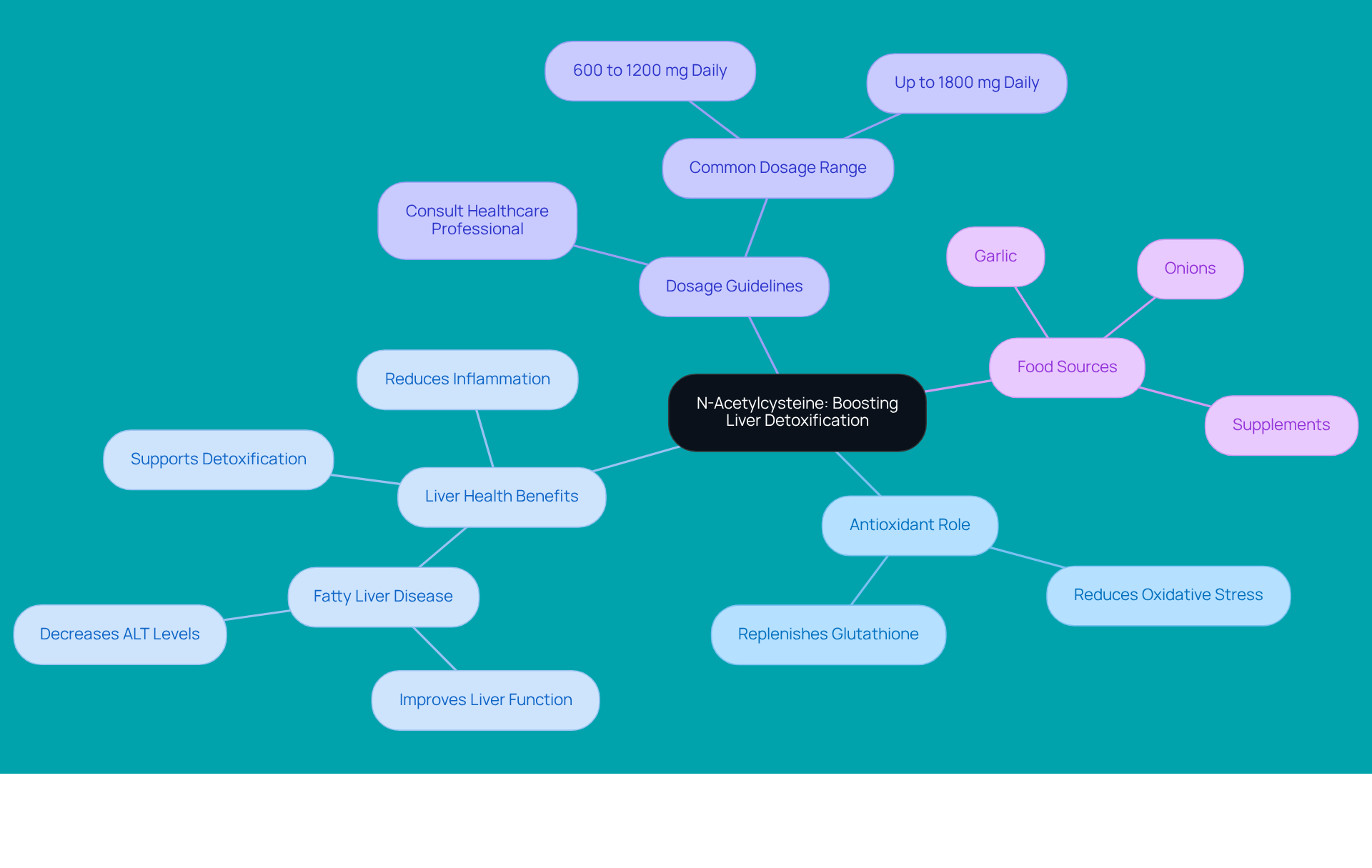
Green Tea Extract: Antioxidant Support for Liver Health
Green tea extract has gained recognition as a key ingredient in fatty liver supplements due to its remarkable concentration of catechins—potent antioxidants that can help reduce fat in the liver and enhance its performance. Imagine if you could support your liver health simply by incorporating this extract into your daily routine. Clinical studies suggest that a daily intake of 250 to 500 mg of green tea extract can offer significant benefits for your liver, primarily by fighting oxidative stress and inflammation. These effects are particularly crucial for those of us looking to improve organ function, especially if you're concerned about fatty liver disease and considering fatty liver supplements.
However, it's essential to approach this with caution. You might be wondering about the safety of high doses. Reports indicate that excessive intake of green tea extract has been linked to approximately 80 instances of organ damage globally. This serves as a reminder of the importance of sticking to recommended dosages and consulting with healthcare professionals before adding high-dose supplements to your regimen.
Additionally, research from Rutgers University sheds light on the complexities of determining who can safely take high doses of green tea extract. This highlights the need for us to be aware and informed, especially considering the lack of regulatory oversight in the supplement industry. Together, let's prioritize our health by making educated choices and seeking support when needed.
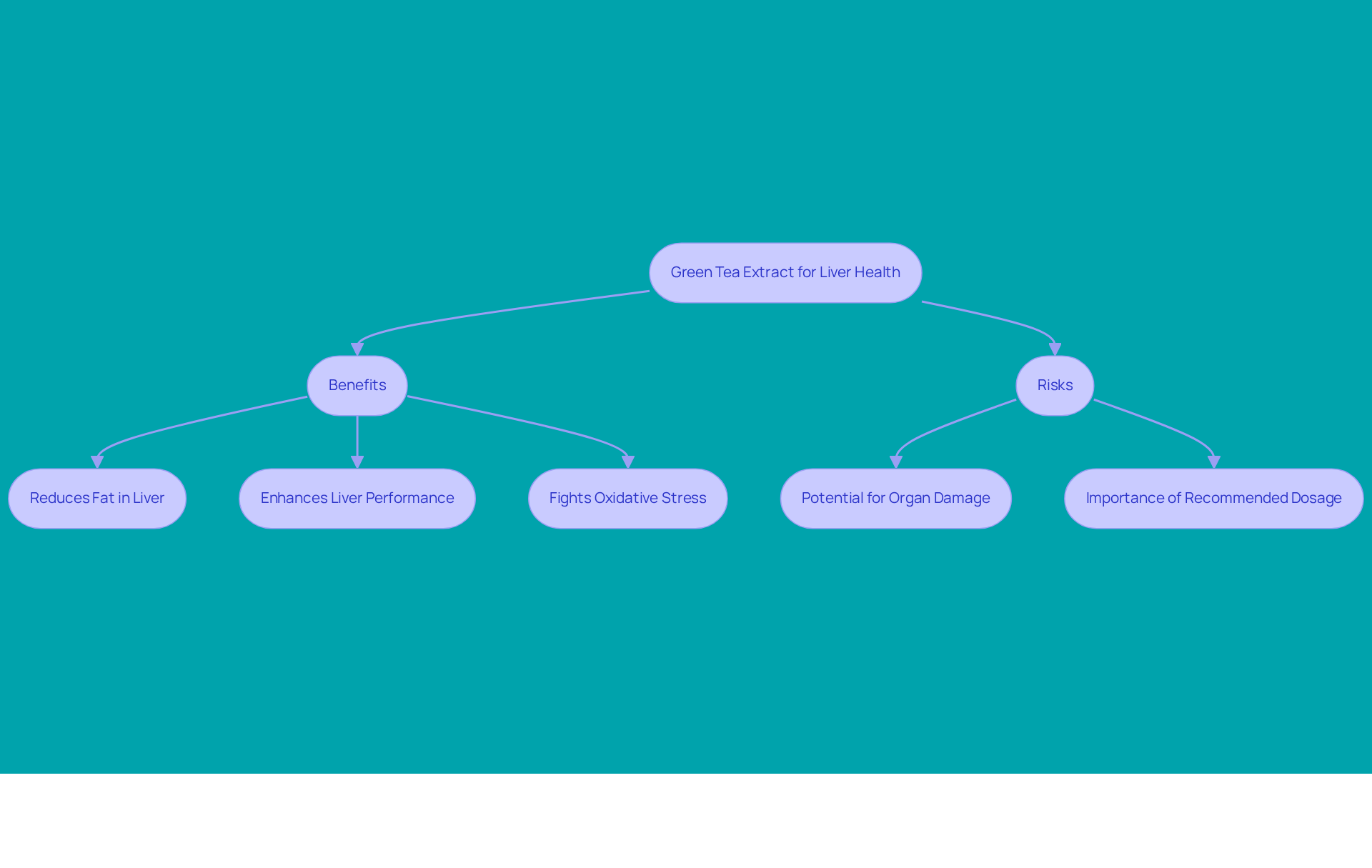
Coenzyme Q10: Enhancing Cellular Energy for Liver Health
Coenzyme Q10 (CoQ10) is a powerful antioxidant that plays a crucial role in energy generation within our liver cells. If you’re concerned about liver health, you might find comfort in knowing that clinical studies suggest fatty liver supplements, such as CoQ10, can significantly improve enzyme levels in the liver and reduce oxidative stress—essential for maintaining its well-being.
Imagine if you could enhance your liver function with a simple addition to your daily routine. A systematic review and meta-analysis published by Soleimani Damaneh et al. revealed that CoQ10 supplementation led to a weighted mean difference of:
- -5.33 IU/L for alanine aminotransferase (ALT)
- -4.91 IU/L for aspartate aminotransferase (AST)
- -8.07 IU/L for gamma-glutamyl transferase (GGT) levels.
These findings demonstrate CoQ10's effectiveness in supporting liver health, especially when combined with fatty liver supplements.
You might be wondering about the right dosage. A common recommendation ranges from 100 to 300 mg daily, tailored to your personal wellness needs. While CoQ10 is naturally found in foods like fatty fish, meat, and whole grains, those of us facing liver issues may benefit from fatty liver supplements to achieve optimal levels.
Research has shown that CoQ10 not only enhances liver performance but also promotes overall well-being. This makes it a valuable addition to any wellness routine that includes fatty liver supplements for liver support. Together, let’s consider taking action—further high-quality randomized controlled trials are recommended to confirm these promising findings, paving the way for even better health solutions.
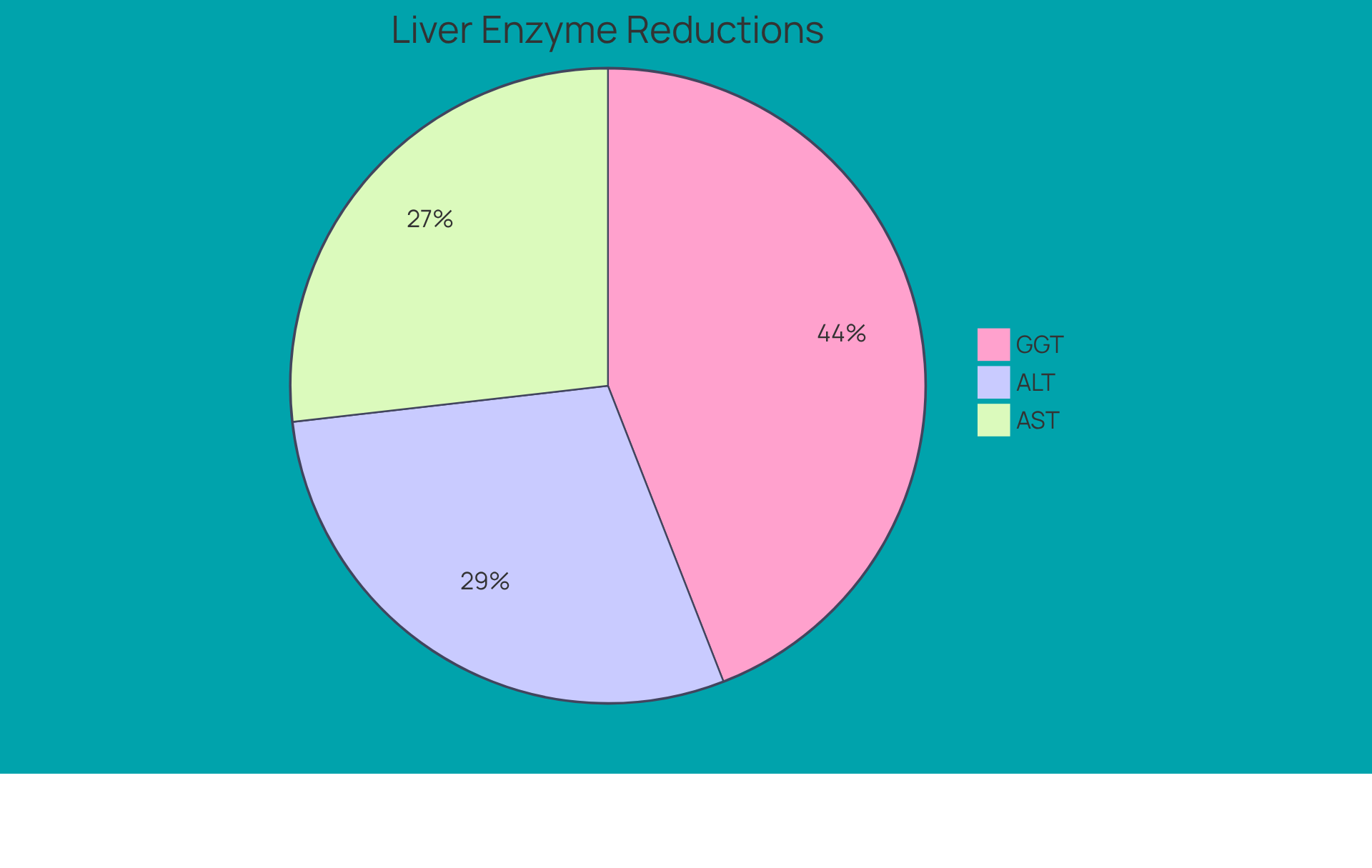
Berberine: Managing Blood Sugar and Liver Fat
Berberine is a powerful natural substance that can significantly improve insulin sensitivity and help reduce fat in the liver, making it especially beneficial for those considering fatty liver supplements for non-alcoholic fatty liver disease (NAFLD). Imagine if you could lower your blood sugar levels and enhance your liver function with a simple addition to your daily routine. Recent studies suggest that a daily dosage ranging from 500 to 1,500 mg can lead to remarkable reductions in fasting and postprandial glucose levels—by more than 30 percent in some cases.
This remarkable compound works by activating AMP-activated protein kinase (AMPK), a key regulator of metabolism. What’s more, berberine is usually inexpensive, making it an appealing option for health-conscious individuals, particularly those in low-income areas. Available as fatty liver supplements, it is derived from various plants, including goldenseal and barberry.
While clinical research underscores the effectiveness of fatty liver supplements in managing blood sugar and supporting liver health—highlighted by a systematic review and meta-analysis from 2022 that confirmed their role in lowering hemoglobin A1C levels and their safety for use—it's essential to consider potential side effects. Common experiences may include:
- Abdominal pain
- Constipation
- Diarrhea
Therefore, you might be wondering about the best way to start this journey. Consulting with a healthcare provider before beginning berberine supplementation is a wise step towards ensuring your health and well-being.

It Works!: Comprehensive Nutritional Support for Liver Wellness
At It Works!, we understand the importance of nurturing your health and well-being. Our varied selection of nutritional supplements, which includes fatty liver supplements, is specifically designed to promote organ wellness, featuring items rich in antioxidants, omega-3 fatty acids, and herbal extracts like milk thistle and turmeric. These carefully crafted formulations prioritize natural ingredients that support detoxification and enhance overall wellness.
Many of our clients have shared their positive experiences, highlighting significant improvements in their health after incorporating It Works! products into their daily routines. One customer expressed, "After using It Works! with these supplements, I feel more energetic, and my organ function tests have improved significantly." This kind of feedback reassures us that we are making a difference in people's lives, especially for those managing fatty organ disease.
Imagine if you could explore and manage your wellness journey effortlessly. Our user-friendly eSuite platform allows you to do just that, ensuring a seamless experience as you work towards your fitness objectives. Recent reviews from 2025 reveal high levels of customer satisfaction, with 85% of users praising the effectiveness of It Works! organ health products in promoting vitality and well-being.
Remember, maintaining a balanced diet and healthy lifestyle is crucial for optimal liver function, enhancing the effects of fatty liver supplements. Together, we can take steps towards a healthier future.
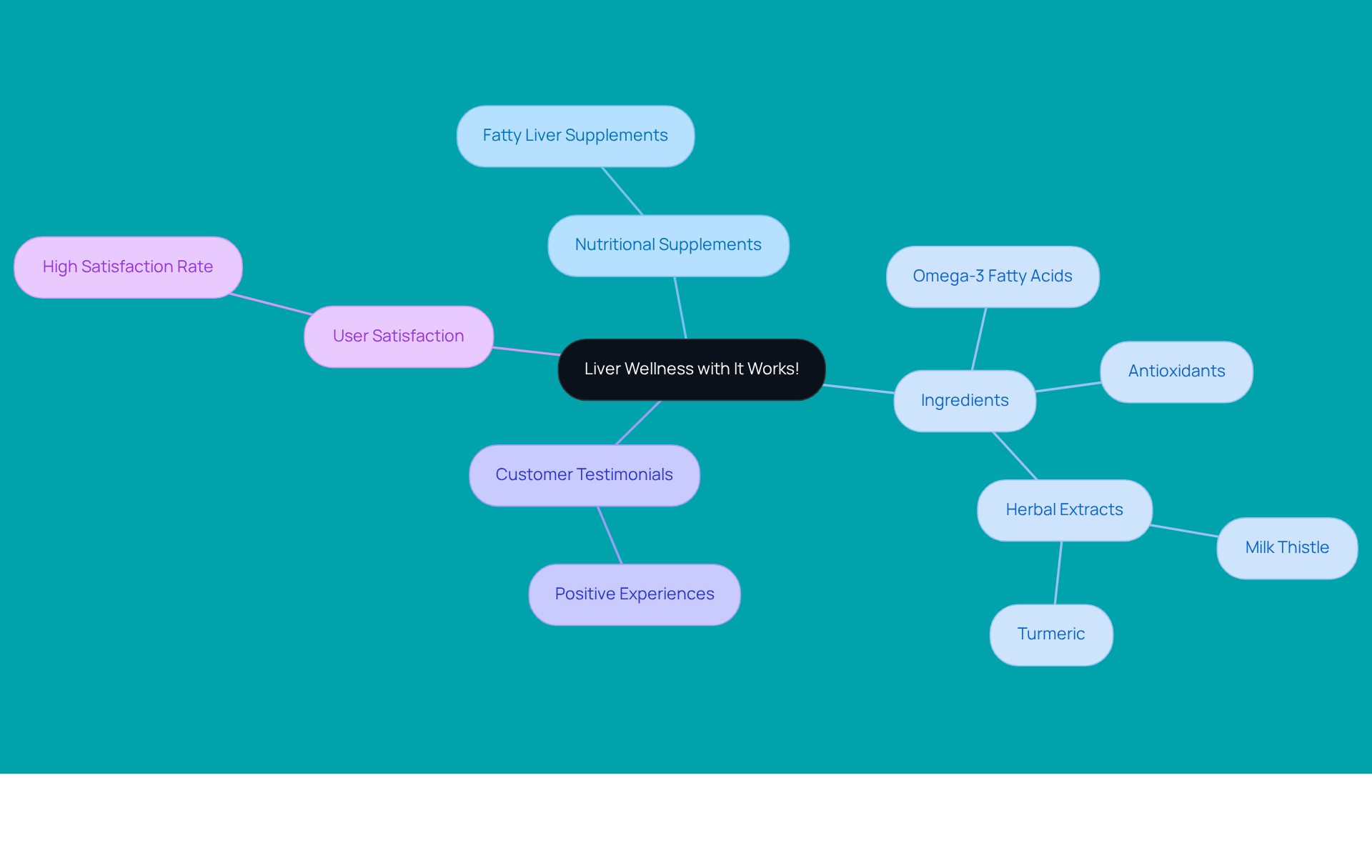
Conclusion
Incorporating essential fatty liver supplements into your daily health routine can significantly enhance liver function and overall well-being. Imagine if each supplement, from milk thistle to berberine, could offer unique benefits that protect and regenerate liver cells while addressing inflammation and oxidative stress. By prioritizing these supplements, you are taking a proactive step toward maintaining optimal liver health, especially if you are at risk for conditions such as non-alcoholic fatty liver disease (NAFLD).
Key insights highlight the importance of specific nutrients. For instance:
- Omega-3 fatty acids are vital for reducing liver fat.
- Vitamin E serves as a powerful antioxidant that can alleviate liver inflammation.
- Turmeric and probiotics further support liver function by combating inflammation and enhancing gut health, respectively.
- N-acetylcysteine and green tea extract play crucial roles in detoxification and oxidative stress reduction, making them essential components of a holistic health strategy.
Ultimately, your journey to better liver health involves informed choices and a commitment to a balanced lifestyle. By integrating these fatty liver supplements into your daily routine, you can take meaningful steps toward improving your liver function and overall health. Embracing this knowledge empowers you to make choices that foster wellness and longevity, ensuring that liver health remains a priority in your life.
Frequently Asked Questions
What is milk thistle and how does it benefit liver health?
Milk thistle, particularly its active component silymarin, offers protective effects on liver cells against toxins and inflammation. It supports liver tissue regeneration and enhances organ function, especially in individuals with liver-related disorders like non-alcoholic fatty liver disease (NAFLD).
What research supports the effectiveness of silymarin in liver health?
A systematic review of clinical trials indicates that silymarin can significantly decrease liver enzyme levels, which are key indicators of liver health. A meta-analysis showed that silymarin treatment resulted in reduced enzyme levels, demonstrating its effectiveness in promoting liver wellness.
What is the recommended dosage of silymarin for liver health?
Typical dosages of silymarin range from 140 to 600 mg daily, tailored to individual wellness needs and formulations. Regular intake can enhance detoxification processes and improve overall liver function.
What role do omega-3 fatty acids play in liver health?
Omega-3 fatty acids, sourced from fish oil and certain plant oils, are essential for reducing fat and enhancing enzyme levels in the liver. They help decrease fat content and inflammation in organs, benefiting individuals with fatty organ conditions.
What is the recommended daily intake of omega-3 fatty acids?
Clinical studies suggest a daily intake of 2 to 4 grams of omega-3s for therapeutic benefits, which can improve lipid metabolism and lower triglyceride levels.
What foods are high in omega-3 fatty acids?
Foods rich in omega-3s include fatty fish like salmon, sardines, mackerel, as well as flaxseeds, chia seeds, and walnuts.
Are there any side effects associated with omega-3 supplementation?
Some individuals may experience mild side effects such as a fishy aftertaste, nausea, or digestive upset. It is advisable to consult a healthcare specialist before starting any fatty liver supplements.
How does Vitamin E support liver health?
Vitamin E acts as an antioxidant, neutralizing free radicals and protecting liver cells from oxidative damage. It may lead to significant improvements in liver function and reduce markers of liver inflammation.
What is the recommended dosage of Vitamin E for liver health?
Clinical studies suggest a daily dosage of 400 to 800 International Units (IU) of Vitamin E for significant improvements in liver health.
Is it safe to take Vitamin E supplements?
Vitamin E is generally well tolerated, but some individuals may experience mild gastrointestinal symptoms. It is important to consult with a healthcare provider before starting any new supplement regimen, especially for those with pre-existing health conditions.




